Faith

During all my reading about Robyn and Lady Gaga I came across some stuff about Lady Gaga that I found interesting, theologically speaking. As I told Jana over the summer, "I'm sort of developing a theological curiosity about Lady Gaga." Jana asked, "How so?"
Well, Lady Gaga calls her fans "monsters." Or "little monsters." And by that she means freaks--the odd, the weird, the lonely, the rejects, the nerds, the castoffs. And you can't help but wonder, in light of the gospels, about that demographic. In my book Unclean I have a chapter on monsters. And I've written about the theology of monsters on this blog. Consequently, Lady Gaga's use of the label "monsters" caught my attention.
Because as I've written, the category "monster" is charged with ambivalence. On the surface the monster is a normative threat--a defilement, a degradation, a location of moral and communal harm. Thus, monsters are expelled from community. And yet, most monster stories suggest that the monster is often a scapegoat. That the monster is more victim than victimizer. Underneath, if we could but see it, the monster is one of us.
So it's theologically apt that Lady Gaga uses the category monster for her fans. Because she's targeting a group that has been cast out of society. Again, she's explicitly embracing the freaks, weirdos and social outcasts. But Gaga, like in the monster stories, has flipped this and made the label "monster" a term of affection, welcome, embrace, community, inclusion and hospitality. (The diminutive "little" signals the playful affection.) This parallels my own interests in Unclean--Can we show hospitality toward monsters? So I'm intrigued by Gaga's community of "little monsters."
In this segment from his new CatholicTV series "Blinks," the Rev. Jim Martin (aka our favorite Jesuit) considers why Christianity is often considered so joyless, and why "religious" usually means serious.
Watch inside...
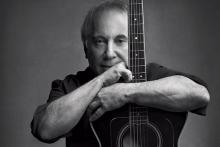
"How was all of this created? If the answer to that question is God created everything, there was a creator, than I say, great! What a great job. And I like the idea. I find it very, I don’t know, I find it comforting in some way. But if the answer to that is there is no God, I don’t feel like, well, what a jerk I’ve been. I feel, oh fine, so there’s another answer. I don’t know the answer. I’m just a speck of dust here for a nanosecond, and I’m very grateful." — Paul Simon in an interview that will air this weekend on the PBS program Religion & Ethics Newsweekly.
Watch the interview in its entirety inside ...

I have a number of identifiers on my various venues I write for and on my email signature: heretic, antagonist, father, son, instigator, pop culture junkie, theologian, social media guru, and so on. But one seems to resonate with folks more than any other: GOD NERD.
For some it’s just a funny juxtaposition of words. For others, there is something deeply relate-able in the moniker. Incidentally, the simple fact that I use words like “moniker” make clear the fact that I and a card-carrying, credentialed nerd.
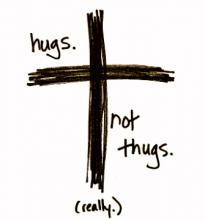
12. Do something really nice – that no one knows about.
11. Spend more money on other people than I spend on myself. Love my neighbor as I love myself. And love myself as I love my neighbor.
10. Laugh often… especially at advertisements that try to convince me that I must buy more stuff in order to be happy.
It’s been a bad year, and the 2012 election year looks to be even worse.
Don’t get me wrong — there were many good and even wonderful things about 2011. I can point to weddings, great things in our family lives, wonderful moments with our children, acts of courage in our local and our global communities, and heroic accomplishments by people of faith and others of good will.
But when it comes to politics and to the media, 2011 was an abysmal year.
Washington is a dysfunctional place where we make the most important decisions about how our public resources should be allocated amidst artificial deadlines set entirely by ideological politics instead of the common good. Rational, thoughtful ideas for reducing the national deficit (while at the same time protecting our vital social safety nets and producing needed jobs) have been replaced by the politics of blame and fear.
And winning — at seemingly any cost — has trumped governing. To disagree with the opposition isn’t enough. Now politicians and pundits feel compelled to destroy their opponents’ character, integrity, patriotism, and even attack their faith.
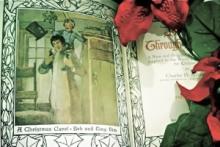
“Marley was dead, to begin with.”
So begins the classic tale of A Christmas Carol by Charles Dickens. It is a story that has been told and re-told through various mediums since the novella was published December 19, 1843.
I sat down recently to watch the new Disney version of the tale. It features a CGI rendition of Scrooge with the voice of Jim Carrey.
After 15 minutes I shut it off.
It wasn’t that it was particularly bad. I didn’t give the movie enough of a chance even to figure whether it was worth watching. What I realized is that I wasn’t much interested in hearing the same story again from a secular perspective.
A Christmas Carol, I would argue, is not ultimately about Christmas, but conversion.
Christmas is the stage and the catalyst through which transformation occurs. It is a leading character to be sure. But, it is the radical change that occurs in Ebenezer Scrooge that most compels me.
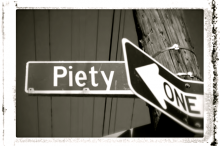
To start, a story.
A few years ago a female student wanted to visit with me about some difficulties she was having, mainly with her family life. As is my practice, we walked around campus as we talked.
After talking for some time about her family situation we turned to other areas of her life. When she reached spiritual matters we had the following exchange:
"I need to spend more time working on my relationship with God."
I responded, "Why would you want to do that?"
Startled she says, "What do you mean?"
"Well, why would you want to spend any time at all on working on your relationship with God?"
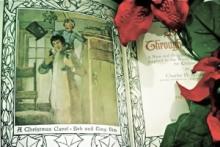
When I imagine Jesus telling his disciples, “Let the little children come to me,” I have a vision of the adults moving aside and Tiny Tim with his crutch crawling into the lap of Christ.
In the scene where Tiny Tim is introduced, his father tells this story of him:
“Somehow, he gets thoughtful, sitting by himself so much, and thinks the strangest things you ever heard. He told me, coming home, that he hoped the people saw him in the church, because he was a cripple, and it might be pleasant to them to remember upon Christmas-day who made lame beggars walk and blind men see.”
It is this child like faith that moves Scrooge to ask the Ghost of Christmas Present if the boy would live to see another Christmas. The spirit answers that he sees an empty chair at the next Cratchit Christmas. Scrooge begs for the future to be changed and the boy spared.
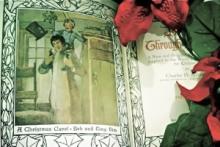
The Ghost of Christmas Past showed Scrooge a total of five visions. It is only the last two which are dark. The first three show the seeds of Scrooges own repentance.
The first vision shown to Scrooge by the Ghost of Christmas past is that of a young Scrooge reading alone, neglected by his peers, just before Christmas. Scrooge, watching his old self, begins to cry.
“What’s the matter?” asked the Spirit.
“Nothing,” said Scrooge. “Nothing. There was a boy singing a Christmas Carol at my door last night. I should have given him something: that’s all.”

I think of Mary, the young woman whose eyes were opened to God’s messenger, whose womb was opened to God in human flesh. The Greeks call her theotokos — the God-bearer.
She is the one who welcomed Jesus to make his home in her. Blessed among women, she is a model for us.
She’s not just an inspiration for a house of hospitality. She is one.
Two years ago, Leah was very pregnant during Advent. Because of high blood pressure, she was on bed rest for most of it. So we waited.
We waited for our daughter to come, and we waited for Christmas. We waited with Mary to greet face-to-face the One whom we invite into our lives every time we whisper a prayer.
Waiting, we learned, changes your relationship to time. You stop partitioning it into blocks, and you learn to receive it.
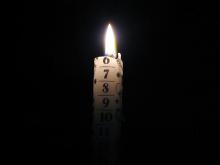

I’d like to share some Advent reflections from my former professor at North Park University, Scot McKnight. He is in the midst of a series that points to what Advent is supposed to remind Christians of. It’s a simple message with deep meaning: Jesus is King.

Failure to provide equal rights for LGBT people doesn’t just hurt those who are gay or lesbian, it also hurts the nearly 2 million children who now live in LGBT households.
Contrary to many stereotypes, children living in LGBT households are 50 percent more likely to live in poverty than those living in heterosexual households. Societal prejudice and discriminatory policies both have something to do with it. A recent report sponsored by the Movement Advancement Project, Family Equality Council and the Center for American Progress, explains why.

It's that time of the year again, the joyful season when Jeff, my iTunes DJ, starts spinning holiday music when I choose "random" from the play options on my keyboard.
I almost always have headphones on with music playing as I work each day, and the surprise of what Jeff, as I call him, comes up with — especially when he reaches into the way-back machine for sonic fodder — is a daily delight.
First thing this morning, Jeff decided to play the tune "Miracle" by Ashville, N.C., singer-songwriter David Wilcox.
Oh joy! It's long been one of my favorite unconventional Christmas songs but I'd forgotten about its many charms until I was taking my first sip of coffee today.
The song, which appears on David's 2006 album Vista, is a take on the Natvity story seen through David's remarkably creative, often childlike sensibilities. Here's a taste of the lyrics:
Few will chose to follow
Out of all the star invites
Most will hide safe inside
With the lantern turned up bright
Waiting for a miracle
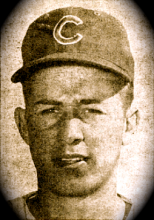
Ron Santo, former Chicago Cubs third baseman and radio announcer, was finally inducted into Baseball’s Hall of Fame on Monday, just over a year after his death.
As many now know, Santo had type 1 diabetes and endured many hardships during his baseball career, as well as every year that followed. In a Guideposts article he wrote about his diagnosis, “Diabetes? I didn't even know what that was. I had just one concern: "Can I still play baseball?"”
Today is Black Friday, the unofficial holiday immediately following Thanksgiving. Today, businesses open very early, offering reduced prices on all manner of consumer items. Customers are encouraged to flood the aisles in search of a good deal on all kinds of things - from DVDs to appliances - but, above all, electronics.
I’ve learned that it’s especially important for those who are always trying to change the world, to remember what they are thankful for in their world as it is!
First I am thankful to God for his or her patience with us. Thankful that despite how much we human beings (perhaps especially we religious believers), so often disappoint, embarrass, and even hurt God with the things we say and do — even in God’s name; that God still continues to love us, forgive us, and call us to act more like God’s children, who should live together like brothers and sisters.
I am thankful to Jesus, who seems to have survived all of us Christians who name his name. Thankful that he is still so popular all over the world, even when Christians are, well, are not so much. But I’m also thankful for when Christians or others actually do the things that Jesus said, love their neighbors and even their enemies, just as he taught us to do, and when we do treat “the least of these” in the same way that we would treat him. I’m always most thankfully surprised by the unexpected and simple acts of love, grace, kindness, welcome, and justice that make people want to believe in and follow Jesus again....
LONDON — It looks like the stage of a West End theater. The tents are gathered around and almost up against the steps of the historic St. Paul’s Cathedral. Each night, a General Assembly is held on those steps, and the sermons on inequality have a biblical ring to them.
This is Occupy London and the Occupiers were having their discussions with each other and visitors in the protective shadow of the Dome of St. Paul’s — as they should be. What a picture of the Incarnation, I thought, marveling at the scene.
What makes Christian faith most unique among all the religions of the world is, indeed, the incarnation. In Jesus Christ, God hits the streets — that’s what Incarnation means.
So here is the church in the midst of the international conversation that is changing the world — right where we should be.
Bread for the World has many recommendations in the new report, but I’d like to highlight just one for now: “Farm policies should lean more towards the production of healthy foods.”
Why this one? Most farm subsidies go to (wait for it) the largest, wealthiest producers (shocking, right?). Billions of dollars are spent subsidizing corn, wheat, soybeans, cotton and rice. Small and medium-size producers (many of whom grow vegetables — the foods that are supposed to make up half our dinner plate) receive little, if any, support from the current U.S. farm policy.
Securing affordable, healthy foods for our country’s poorest will in turn help us address other issues such as malnutrition and obesity, immigration, health care, and employment.